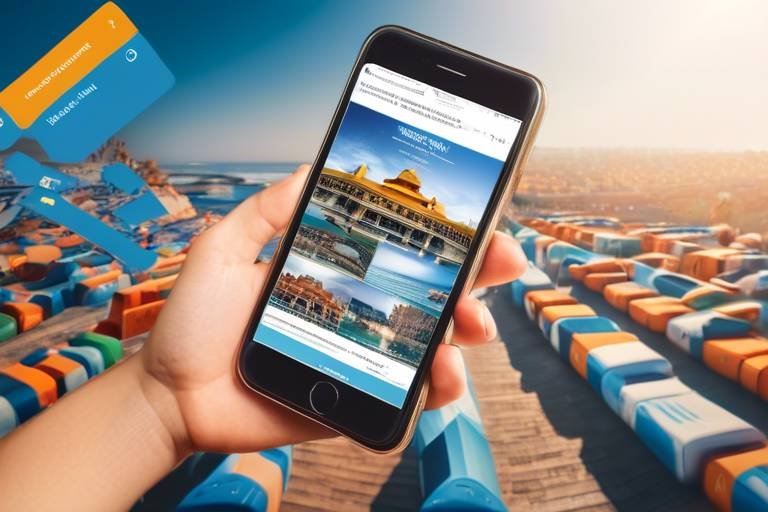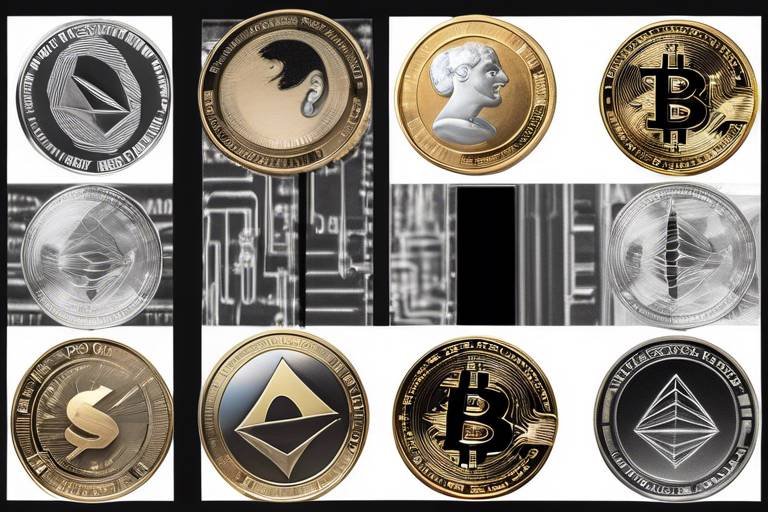Exploring the Use of Blockchain in the Travel Industry
In recent years, the travel industry has witnessed a remarkable transformation, and at the heart of this revolution is blockchain technology. You might be wondering, what exactly is blockchain, and how does it fit into the travel sector? Well, imagine a digital ledger that records transactions across multiple computers in a way that ensures the information is secure, transparent, and immutable. This technology is not just a buzzword; it's a game-changer that is reshaping how we travel and how businesses operate within the industry.
As travelers, we often face challenges such as fraudulent transactions, hidden fees, and lack of transparency regarding service providers. Blockchain addresses these issues head-on by providing a decentralized framework that enhances security and trust. For instance, when you book a flight or hotel, blockchain can ensure that your payment is processed securely, and your personal data is protected from potential breaches. Wouldn't it be reassuring to know that every transaction you make is safeguarded by cutting-edge technology?
Moreover, blockchain's ability to enhance transparency means that travelers can trace the origins of their services. For example, if you book a tour, you can verify the credentials of the tour operator and ensure that they adhere to ethical practices. This level of transparency builds trust and accountability, making your travel experience not just enjoyable but also responsible.
But that's not all! Blockchain also streamlines operations for travel companies, reducing costs and improving efficiency. By automating processes through smart contracts, businesses can eliminate the need for intermediaries, allowing for faster and more cost-effective transactions. Imagine booking a vacation package without the hassle of dealing with multiple agents—just a straightforward, transparent process where everything is handled seamlessly.
As we dive deeper into this article, we will explore various applications of blockchain in the travel industry, from enhancing security in transactions to improving transparency in supply chains. We'll also take a look at the future potential of smart contracts and decentralized booking systems that promise to revolutionize how we travel. So, buckle up—it's going to be an exciting journey into the world of blockchain!
To fully appreciate how blockchain is transforming the travel industry, it's essential to grasp the fundamental principles of this technology. At its core, blockchain is a distributed ledger technology (DLT) that records transactions in a secure, transparent, and immutable way. Each transaction is grouped into blocks, which are then linked together in a chronological chain. This structure ensures that once data is recorded, it cannot be altered or deleted without consensus from the network participants.
Key features that make blockchain revolutionary include:
- Decentralization: Unlike traditional databases controlled by a single entity, blockchain operates on a peer-to-peer network, reducing the risk of data manipulation.
- Transparency: Every participant in the blockchain can access the same information, fostering trust among users.
- Security: Advanced cryptographic techniques protect data, making it nearly impossible for unauthorized users to access or alter information.
These features make blockchain an ideal solution for various sectors, particularly travel, where security and trust are paramount. As we delve deeper into the specific applications of blockchain in travel, you'll see just how impactful this technology can be.
When it comes to travel, security is a top concern for both consumers and businesses. With the rise of online booking platforms, the risk of fraudulent transactions has increased significantly. Blockchain technology enhances security by providing a robust framework for processing payments and storing sensitive data. By utilizing cryptographic techniques, blockchain ensures that your personal information remains confidential and secure from cyber threats.
One of the most exciting applications of blockchain in the travel industry is the use of smart contracts. These are self-executing contracts with the terms of the agreement directly written into code. In the travel sector, smart contracts can automate various processes, such as booking confirmations and payment settlements, reducing the need for intermediaries. Imagine booking a hotel room where the payment is automatically released to the hotel once you check in—no fuss, no delays!
Several companies are already reaping the benefits of smart contracts in their operations:
| Company | Application | Benefits |
|---|---|---|
| Travala | Decentralized hotel bookings | Lower fees, increased transparency |
| LockTrip | Smart contract-based bookings | Reduced reliance on intermediaries |
Looking ahead, the potential for smart contracts in the travel industry is vast. As technology evolves, we may see even more sophisticated applications that can handle complex agreements and multi-party transactions. However, challenges such as regulatory compliance and integration with existing systems will need to be addressed to fully harness this potential.
Another significant advantage of blockchain technology is its ability to enhance transparency within travel supply chains. With blockchain, consumers can trace the origins of services and products, ensuring that they are ethically sourced and of high quality. This level of transparency not only builds trust but also encourages businesses to adopt more sustainable practices.
For travel companies, efficiency is key to staying competitive. Blockchain technology can streamline operations by automating processes and reducing overhead costs. From managing bookings to handling customer data, blockchain can simplify numerous operational areas, allowing companies to focus on providing exceptional service to their customers.
Imagine a world where you can book your travel directly with service providers, bypassing traditional booking platforms. Decentralized booking systems enabled by blockchain technology have the potential to disrupt the current model, offering travelers more options and better prices. This innovation could lead to a more democratized travel experience, where consumers have greater control over their choices.
Despite its many benefits, the adoption of blockchain technology in the travel industry is not without challenges. Issues such as scalability, regulatory hurdles, and integration with existing systems pose significant obstacles. Companies must navigate these challenges carefully to leverage blockchain's full potential while ensuring compliance with industry standards.
- What is blockchain technology? Blockchain is a decentralized digital ledger that records transactions securely and transparently.
- How does blockchain enhance security in travel? It protects sensitive data through cryptographic techniques and ensures secure payment processing.
- What are smart contracts? Smart contracts are self-executing contracts with the terms directly written into code, automating transactions.
- What challenges does blockchain face in the travel industry? Challenges include scalability, regulatory compliance, and integration with existing systems.

Understanding Blockchain Technology
Blockchain technology is often described as a revolutionary advancement, and for good reason! At its core, blockchain is a decentralized digital ledger that records transactions across many computers in such a way that the registered transactions cannot be altered retroactively. This means that every participant in the network has access to the same information, which fosters an environment of trust and transparency. Imagine a group of friends who all keep a shared diary of their outings. If one person tries to change an entry, everyone else can see the original note. This is how blockchain functions, ensuring that all data is consistent and secure.
The fundamental principles of blockchain technology can be boiled down to a few key features:
- Decentralization: Unlike traditional databases that are controlled by a central authority, blockchains are distributed across a network of nodes, making them less vulnerable to hacks and fraud.
- Immutability: Once data is recorded on a blockchain, it cannot be changed without altering all subsequent blocks, which requires consensus from the network. This provides a high level of security and integrity.
- Transparency: All transactions are visible to participants in the network, which builds trust among users. This transparency is particularly beneficial in industries like travel, where accountability is crucial.
- Smart Contracts: These are self-executing contracts with the terms directly written into code. They automate processes and eliminate the need for intermediaries, making transactions faster and cheaper.
To illustrate the impact of blockchain, consider its application in the travel industry. Imagine booking a flight and being able to trace every step of your journey—from the airline's operational practices to the environmental impact of the aircraft. Blockchain can provide this level of detail, enhancing consumer confidence and promoting ethical practices. Furthermore, by streamlining the verification of identities and payments, blockchain can significantly reduce the time and costs associated with travel transactions.
As we delve deeper into the travel industry, we’ll see how these features of blockchain can address some of its most pressing challenges, such as data breaches and fraud. The ability to securely share information without relying on a central authority could very well transform how we travel. So, buckle up as we explore the exciting world of blockchain in the travel sector!

Enhancing Security in Travel Transactions
In the fast-paced world of travel, where transactions occur at lightning speed, ensuring the security of sensitive data is paramount. As travelers, we often share personal information, such as our credit card details and identification, with various service providers. This is where blockchain technology steps in to revolutionize how we think about security in travel transactions. By leveraging its decentralized nature, blockchain provides a robust framework that enhances data protection and minimizes the risk of fraud.
One of the most significant benefits of blockchain is its ability to create a secure, tamper-proof ledger of transactions. Each transaction is encrypted and linked to the previous one, forming a chain of blocks that is nearly impossible to alter. This means that any attempt to change a transaction would require altering every subsequent block, which is practically unfeasible. As a result, travelers can rest easy knowing their data is safeguarded against malicious attacks.
Moreover, blockchain technology eliminates the need for intermediaries, such as banks or payment processors, which often introduce vulnerabilities into the transaction process. By allowing direct peer-to-peer transactions, blockchain reduces the number of potential points of failure. This not only enhances security but also allows for faster transactions. Imagine booking a flight and having the payment processed instantaneously, without waiting for third-party verification—this is the promise of blockchain.
Another essential aspect of blockchain’s security features is its ability to provide transparency. Each transaction is recorded on a public ledger that can be accessed by all parties involved. This transparency builds trust between travelers and service providers, as both parties can verify the transaction history without needing to rely on a central authority. For example, if a traveler books a hotel through a blockchain-enabled platform, they can easily check the legitimacy of the hotel’s claims and ensure that their payment is secure.
However, while blockchain technology holds immense potential, it is not without challenges. Issues such as scalability and regulatory compliance can hinder its widespread adoption in the travel industry. For instance, as the number of transactions increases, the blockchain network can become congested, leading to slower processing times. Addressing these challenges will be crucial for the successful implementation of blockchain in travel.
To summarize, the integration of blockchain technology into travel transactions represents a significant leap forward in enhancing security. By protecting sensitive data, reducing the risk of fraud, and increasing transparency, blockchain can transform the travel experience for consumers and businesses alike. As we move towards a more digital future, embracing these innovative solutions will be key to ensuring a safe and seamless travel experience.
- How does blockchain improve security in travel transactions? Blockchain enhances security by creating a tamper-proof ledger of transactions that is encrypted and linked, making it difficult for fraudsters to alter transaction data.
- What are the benefits of using blockchain for payment processing? Blockchain allows for direct peer-to-peer transactions, eliminating intermediaries, which speeds up the payment process and reduces potential vulnerabilities.
- Are there any challenges associated with implementing blockchain in the travel industry? Yes, challenges include scalability issues, regulatory compliance, and the need for integration with existing systems.

Smart Contracts in Travel
Imagine booking a vacation where every detail is seamlessly handled without the need for endless emails or phone calls. Smart contracts are making this dream a reality in the travel industry. These self-executing contracts with the terms directly written into code are revolutionizing how we approach agreements and transactions. But what exactly are smart contracts, and how do they fit into the travel landscape?
At their core, smart contracts run on blockchain technology, which ensures that once a contract is created, it cannot be altered, providing a level of security and trust that is hard to match. For travelers, this means that every aspect of their journey—from booking flights to securing hotel accommodations—can be managed through these automated agreements, greatly reducing the risk of fraud and misunderstandings.
For example, consider a traveler who books a hotel room. Traditionally, this process involves multiple intermediaries: the traveler, the booking platform, and the hotel itself. Each party has to trust the others to fulfill their obligations. However, with smart contracts, the entire process can be streamlined. The contract can automatically release payment to the hotel once the traveler checks in, ensuring that funds are only transferred when services are delivered.
Additionally, smart contracts can handle various scenarios that might arise during a trip. Suppose a traveler’s flight is delayed. A smart contract could automatically trigger a refund or rebooking process without requiring the traveler to contact customer service. This level of automation not only saves time but also enhances the overall travel experience.
As we look at the broader implications, it's clear that smart contracts can significantly reduce operational costs for travel companies. By minimizing the need for intermediaries, companies can allocate resources more efficiently and pass those savings on to consumers. Moreover, the transparency of blockchain ensures that all parties have access to the same information, which can help resolve disputes quickly and fairly.
However, the implementation of smart contracts in travel is still in its early stages. Many companies are exploring pilot projects, and while the potential is enormous, there are challenges to consider. For instance, integrating existing systems with blockchain technology can be complex, and regulatory frameworks are still evolving.
In conclusion, smart contracts represent a game-changing technology for the travel industry. They promise not only to enhance the efficiency of transactions but also to create a more enjoyable and secure experience for travelers. As this technology continues to develop, we can expect to see more companies embracing smart contracts, paving the way for a new era in travel.
- What is a smart contract? A smart contract is a self-executing contract with the terms of the agreement directly written into code, which runs on blockchain technology.
- How do smart contracts improve travel transactions? They automate processes, reduce the need for intermediaries, and ensure secure and transparent transactions.
- Are there any challenges in implementing smart contracts in travel? Yes, challenges include integrating with existing systems and navigating regulatory hurdles.
- What are the benefits of using smart contracts for travelers? Benefits include reduced fraud, automated processes, and enhanced transparency.

Case Studies of Smart Contracts
Smart contracts are revolutionizing the travel industry by automating processes and enhancing efficiency. Let’s dive into some compelling case studies that showcase how leading companies are leveraging this technology to streamline their operations and improve customer experiences.
One prominent example is TravelChain, a platform that connects travel service providers directly with consumers. By utilizing smart contracts, TravelChain eliminates the need for intermediaries, allowing travelers to book services such as flights and accommodations directly from providers. This not only reduces costs but also increases transparency, as all transactions are recorded on the blockchain. Imagine booking a hotel room and knowing exactly where your money is going—no hidden fees, no surprises!
Another notable case is Winding Tree, a decentralized travel marketplace that uses blockchain to facilitate direct transactions between travel service providers and customers. Winding Tree’s smart contracts automatically execute agreements when predetermined conditions are met. For instance, if a flight is delayed, the smart contract can trigger refunds or rebooking processes without the need for human intervention. This level of automation not only enhances efficiency but also significantly reduces the potential for disputes, making the travel experience smoother for everyone involved.
Additionally, LockTrip has made waves in the hotel booking sector by integrating smart contracts into their platform. LockTrip allows users to book hotels at discounted rates by bypassing traditional booking platforms. Their smart contracts handle payments and reservations seamlessly, ensuring that both the traveler and the hotel are protected. This approach not only fosters trust but also encourages more competitive pricing, benefiting consumers.
To illustrate the benefits of these implementations, let’s take a look at a comparison table that highlights the key advantages of smart contracts in these case studies:
| Company | Key Feature | Benefit |
|---|---|---|
| TravelChain | Direct transactions | Reduced costs and increased transparency |
| Winding Tree | Automated agreements | Enhanced efficiency and fewer disputes |
| LockTrip | Competitive pricing | Better deals for consumers |
These case studies clearly demonstrate the transformative potential of smart contracts in the travel industry. As these technologies continue to evolve, we can expect to see even more innovative applications that will further enhance the travel experience for both consumers and service providers.
- What are smart contracts? Smart contracts are self-executing contracts with the terms of the agreement directly written into code on the blockchain.
- How do smart contracts improve the travel industry? They automate processes, reduce the need for intermediaries, and enhance transparency and security in transactions.
- Can smart contracts be used for all types of travel transactions? While they are highly effective for many transactions, adoption may vary based on the specific needs and regulations of different travel services.

Future Potential of Smart Contracts
The future of smart contracts in the travel industry is as exciting as it is unpredictable. Imagine a world where booking a flight or a hotel room is as simple as clicking a button, with all agreements automatically executed without the need for intermediaries. This is not just wishful thinking; it's a glimpse into the potential that smart contracts hold. As the travel landscape continues to evolve, these digital agreements could redefine how transactions are conducted, offering a seamless experience for travelers.
One of the most promising aspects of smart contracts is their ability to automate processes. For instance, consider a scenario where a traveler books a trip. A smart contract could automatically handle payments, confirm reservations, and even issue refunds if necessary—all without human intervention. This not only speeds up the transaction process but also significantly reduces the chances of errors and disputes. In an industry where timing is crucial, the efficiency brought by smart contracts could be a game-changer.
However, while the potential is vast, there are hurdles to overcome. The adoption of smart contracts requires a shift in how businesses operate and interact with technology. Companies will need to invest in blockchain infrastructure and educate their staff about this innovative approach. Additionally, regulatory frameworks surrounding smart contracts are still in their infancy, which could pose challenges for widespread implementation.
Furthermore, as more travel companies begin to explore smart contracts, we can expect to see increased collaboration across the industry. Imagine a network of hotels, airlines, and travel agencies all operating on a unified blockchain platform. This could lead to more competitive pricing, enhanced customer service, and a more integrated travel experience. However, for this vision to become a reality, stakeholders must work together to create standards and protocols that facilitate interoperability.
In conclusion, the future of smart contracts in the travel industry is filled with potential. As technology advances and businesses adapt, we may find ourselves in a world where travel transactions are not only faster and more secure but also more transparent and trustworthy. The evolution of smart contracts could usher in a new era of travel, making it easier for everyone to explore the world. So, are you ready to embrace the change?
- What are smart contracts? Smart contracts are self-executing contracts with the terms of the agreement directly written into code, allowing for automatic execution without intermediaries.
- How can smart contracts benefit travelers? They can streamline booking processes, reduce errors, and ensure secure transactions, making travel more efficient and enjoyable.
- What challenges do smart contracts face in the travel industry? Challenges include regulatory hurdles, the need for industry-wide standards, and the integration with existing systems.
- Will smart contracts replace traditional booking systems? While they may not completely replace traditional systems, they have the potential to disrupt and enhance the current landscape significantly.
- How can travel companies prepare for the adoption of smart contracts? Companies can start by investing in blockchain technology, training their staff, and collaborating with other industry players to create a cohesive approach.

Improving Transparency in Supply Chains
In today's fast-paced travel industry, transparency is not just a buzzword; it’s a necessity. Imagine booking a vacation and having the confidence to know exactly where your money is going and how your travel services are sourced. This is where blockchain technology steps in, acting as a beacon of clarity in a sea of uncertainty. By utilizing a decentralized ledger, blockchain allows all parties involved in the travel supply chain to access and verify information in real-time. This means that travelers can trace the origins of their flights, accommodations, and other services, leading to a more informed and secure travel experience.
One of the most significant advantages of blockchain in improving transparency is its ability to create an immutable record of transactions. Each time a service is booked or a payment is made, that transaction is securely recorded on the blockchain. This transparency not only builds trust among consumers but also holds businesses accountable for their practices. For instance, if a hotel claims to be eco-friendly, travelers can verify this claim by tracing the hotel’s supply chain and ensuring that sustainable practices are indeed being followed.
Furthermore, the implementation of blockchain can significantly reduce instances of fraud and misrepresentation in the travel sector. With traditional systems, it can be challenging to verify the authenticity of travel providers or the quality of services offered. However, with blockchain, every participant in the supply chain—from airlines to hotels to local tour operators—can be verified through their unique digital identities. This not only protects consumers but also enhances the overall reputation of the travel industry.
To illustrate the impact of blockchain on transparency, consider the following table showcasing potential benefits:
| Benefit | Description |
|---|---|
| Traceability | Travelers can track the entire journey of their services, from booking to delivery. |
| Accountability | Service providers are held responsible for their claims and practices. |
| Fraud Prevention | Reduces the risk of scams and misrepresentation in the travel industry. |
| Consumer Trust | Increased transparency fosters trust between consumers and service providers. |
In conclusion, blockchain technology is revolutionizing the way transparency is perceived and implemented within the travel supply chain. As travelers become more discerning and demand greater accountability, the adoption of blockchain will likely become a standard practice in the industry. This shift not only benefits consumers but also encourages businesses to adopt ethical practices, ultimately leading to a more sustainable and trustworthy travel ecosystem.
- What is blockchain technology? Blockchain is a decentralized digital ledger that records transactions across multiple computers, ensuring that the information is secure and cannot be altered.
- How does blockchain improve transparency? By providing a public and immutable record of transactions, blockchain allows all parties to verify and trace the origins of services and products.
- Can blockchain prevent fraud in the travel industry? Yes, blockchain enhances security and accountability, significantly reducing the potential for fraud and misrepresentation.
- What are the challenges of implementing blockchain in travel? Challenges include scalability issues, regulatory hurdles, and the need for integration with existing systems.

Streamlining Operations for Travel Companies
When it comes to the travel industry, efficiency is not just a buzzword; it's a necessity. In an age where travelers expect seamless experiences, travel companies are constantly on the lookout for innovative solutions to streamline their operations. Enter blockchain technology, a game-changer that is reshaping how travel businesses operate. By integrating blockchain into their systems, companies can drastically reduce operational costs and improve service delivery.
One of the most significant advantages of blockchain is its ability to create a decentralized ledger that records every transaction transparently. This means that all stakeholders—from airlines and hotels to travel agencies and customers—can access real-time data. Imagine a scenario where a travel agency can instantly verify a hotel’s availability or an airline’s seat inventory without relying on multiple intermediaries. This not only speeds up the booking process but also minimizes the chances of errors and misunderstandings.
Moreover, blockchain can enhance operational efficiency through the use of smart contracts. These self-executing contracts automatically enforce agreements once predefined conditions are met. For instance, a smart contract could automatically release payment to a hotel once a guest checks in. This eliminates the need for manual processing and reduces the risk of disputes, allowing companies to focus on providing exceptional service rather than getting bogged down in administrative tasks.
In addition, blockchain technology can help in managing customer data more effectively. With traditional systems, data is often siloed, making it difficult for companies to gain insights into customer preferences and behaviors. However, blockchain enables a unified view of customer interactions across different platforms. This holistic approach allows travel companies to personalize their offerings, enhancing customer satisfaction and loyalty. For example, if a traveler frequently books beach vacations, a travel company can tailor promotions and suggestions based on that history.
Furthermore, the implementation of blockchain can lead to significant cost savings. By reducing the reliance on intermediaries, travel companies can keep more of their revenue. This is particularly important in a competitive market where margins can be thin. Companies can reinvest these savings into improving their services, whether it’s through better customer support or enhanced technology.
While the benefits are clear, the transition to blockchain is not without its challenges. Companies must navigate the complexities of integrating new technology into existing systems. This requires careful planning and a willingness to adapt. Additionally, there may be regulatory hurdles that need to be addressed, as the travel industry is subject to various laws and regulations across different regions.
In conclusion, as the travel industry continues to evolve, embracing blockchain technology can provide a significant competitive edge. By streamlining operations, enhancing efficiency, and improving customer experiences, travel companies can not only survive but thrive in this dynamic environment. The future of travel is undoubtedly exciting, and blockchain is at the forefront of this transformation.
- What is blockchain technology? - Blockchain is a decentralized digital ledger that records transactions across multiple computers, ensuring that the recorded transactions cannot be altered retroactively.
- How does blockchain improve security in travel? - Blockchain enhances security by encrypting sensitive data and making it nearly impossible for unauthorized parties to alter or access the information.
- What are smart contracts? - Smart contracts are self-executing contracts with the terms of the agreement directly written into code, enabling automatic execution once conditions are met.
- What challenges do travel companies face in adopting blockchain? - Challenges include integration with existing systems, regulatory compliance, and the need for industry-wide collaboration.

Decentralized Booking Systems
Imagine a world where booking your next vacation is as simple as sending a text message. With powered by blockchain technology, this dream is becoming a reality. Traditional booking platforms often act as intermediaries, taking a cut of your hard-earned money while complicating the process with hidden fees and lengthy procedures. But what if you could book directly with service providers, cutting out the middleman entirely? That's where decentralized systems come into play.
At its core, a decentralized booking system leverages blockchain to create a peer-to-peer network. This means that travelers can connect directly with hotels, airlines, or tour operators without the need for a centralized authority. The result? Increased transparency, reduced costs, and a more user-friendly experience. For instance, when you use a decentralized platform, you can see exactly where your money is going, who is receiving it, and even how services are rated by other travelers.
One of the most exciting aspects of decentralized booking systems is their ability to foster trust. With blockchain's immutable ledger, every transaction is recorded and cannot be altered. This transparency builds confidence among users, as they can verify the legitimacy of a service provider through the blockchain. Imagine being able to check the history of a hotel or the reliability of a tour operator with just a few clicks! This level of accountability is a game-changer in an industry often plagued by reviews that can be manipulated or fabricated.
Furthermore, decentralized booking systems can offer travelers a wider range of options. Instead of being limited to a handful of major players, users can access a global network of service providers. This not only encourages competition but also allows for more personalized experiences. For example, a local bed and breakfast in a remote town could be just a click away, providing travelers with unique accommodations that large chains often overlook.
However, while the potential of decentralized booking systems is vast, there are still hurdles to overcome. Issues such as user adoption, regulatory compliance, and technological integration pose challenges that need addressing. As more travelers become familiar with blockchain technology and its benefits, we can expect a gradual shift towards these innovative systems. The future could see a travel landscape where traditional booking methods are a thing of the past, replaced by a more efficient and user-centric approach.
In summary, decentralized booking systems represent a revolutionary shift in how we plan our travels. By eliminating intermediaries, enhancing transparency, and fostering trust, these systems could redefine the travel experience. As we move forward, it's essential to keep an eye on this evolving technology and its potential to disrupt the status quo in the travel industry.
- What is a decentralized booking system?
A decentralized booking system uses blockchain technology to connect travelers directly with service providers, eliminating the need for intermediaries. - How does blockchain enhance trust in booking systems?
Blockchain records every transaction on an immutable ledger, allowing users to verify the legitimacy of service providers easily. - What are the benefits of using decentralized booking systems?
Benefits include reduced costs, increased transparency, and access to a wider range of service providers. - What challenges do decentralized booking systems face?
Challenges include user adoption, regulatory compliance, and the need for technological integration.

Challenges and Limitations of Blockchain
While blockchain technology offers exciting possibilities for the travel industry, it is not without its challenges and limitations. Understanding these obstacles is crucial for both businesses and travelers who are eager to embrace this innovative technology. One of the most significant challenges is scalability. As more users join the blockchain network, the system can become congested, leading to slower transaction times. Imagine trying to get through a crowded airport security line; the more people there are, the longer it takes for everyone to get through. This analogy holds true for blockchain networks, where increased demand can hinder performance.
Another major hurdle is the regulatory landscape. The travel industry is heavily regulated, and integrating blockchain solutions can be complex due to varying laws across different countries. Companies must navigate these regulations while ensuring compliance, which can be a daunting task. Additionally, the lack of standardized protocols across different blockchain platforms can lead to compatibility issues. It’s like trying to fit a square peg into a round hole—if the systems don’t align, the benefits of blockchain can be lost.
Furthermore, there is a knowledge gap within the industry. Many travel companies may not fully understand how to implement blockchain technology effectively. This lack of understanding can lead to resistance to change, as employees and management may be hesitant to adopt new systems that they do not comprehend. Education and training will be essential to bridge this gap and ensure that the workforce is adequately prepared to leverage blockchain’s potential.
Security, paradoxically, is another concern. While blockchain is often touted for its security features, it is not entirely immune to cyber threats. The technology is only as secure as its weakest link, which often lies in the user interfaces and applications built on top of the blockchain. If these applications are vulnerable, hackers can exploit them, compromising sensitive data. Thus, travel companies must invest in robust security measures to protect their blockchain implementations.
Lastly, the integration of blockchain with existing systems presents a significant challenge. Many travel companies rely on legacy systems that may not be compatible with blockchain technology. Transitioning to a new system involves not only financial costs but also time and effort, which can deter companies from making the switch. The resistance to change can be likened to a ship that is slow to turn; it takes time and effort to change direction, even if the new course is more beneficial.
In conclusion, while blockchain technology holds immense promise for revolutionizing the travel industry, it is essential to acknowledge and address these challenges. By doing so, stakeholders can better prepare for a future where blockchain plays a pivotal role in enhancing security, transparency, and efficiency in travel operations.
- What is blockchain technology?
Blockchain is a decentralized digital ledger that records transactions across many computers so that the recorded transactions cannot be altered retroactively without the alteration of all subsequent blocks and the consensus of the network.
- How does blockchain enhance security in travel?
Blockchain enhances security by providing a tamper-proof record of transactions, protecting sensitive data, and reducing the risk of fraud.
- What are smart contracts?
Smart contracts are self-executing contracts with the terms of the agreement directly written into code, allowing for automated transactions without the need for intermediaries.
- What challenges does blockchain face in the travel industry?
Challenges include scalability, regulatory hurdles, a knowledge gap within the industry, security vulnerabilities, and integration with existing systems.
Frequently Asked Questions
- What is blockchain technology?
Blockchain technology is a decentralized digital ledger that records transactions across many computers securely and transparently. Each block in the chain contains a number of transactions, and once a block is filled, it is added to the chain in a way that is immutable and tamper-proof. This technology is revolutionizing various industries, including travel, by enhancing security and transparency.
- How does blockchain enhance security in travel transactions?
Blockchain enhances security by encrypting sensitive data and providing a secure method for processing transactions. This reduces the risk of fraud and data breaches, ensuring that travelers' personal and financial information remains protected. With blockchain, each transaction is verified by multiple parties, making it nearly impossible for malicious actors to alter the data.
- What are smart contracts and how do they work in the travel industry?
Smart contracts are self-executing contracts with the terms of the agreement directly written into code. In the travel industry, they automate processes such as booking and payment, reducing the need for intermediaries. This not only speeds up transactions but also minimizes costs and errors, making the travel experience smoother for everyone involved.
- Can you provide examples of companies using smart contracts?
Yes! Companies like Winding Tree and Travala are pioneering the use of smart contracts in travel. They enable travelers to book accommodations and services directly with providers, thereby eliminating the need for traditional booking platforms. This leads to lower prices and more transparent transactions.
- What potential challenges does blockchain face in the travel industry?
While blockchain has immense potential, it faces challenges such as scalability issues, regulatory hurdles, and the need for integration with existing systems. Additionally, the technology is still relatively new, and many stakeholders in the travel industry are hesitant to adopt it without clear standards and guidelines.
- How can blockchain improve transparency in travel supply chains?
Blockchain improves transparency by allowing consumers to trace the origins of services and products. For example, travelers can verify the authenticity of their accommodations or the ethical sourcing of their travel experiences. This builds trust and accountability among service providers and consumers.
- What are decentralized booking systems?
Decentralized booking systems are platforms that leverage blockchain technology to allow travelers to book directly with service providers. This disrupts traditional booking platforms by offering more choices, lower fees, and a more direct connection between travelers and providers, ultimately enhancing the overall travel experience.



















